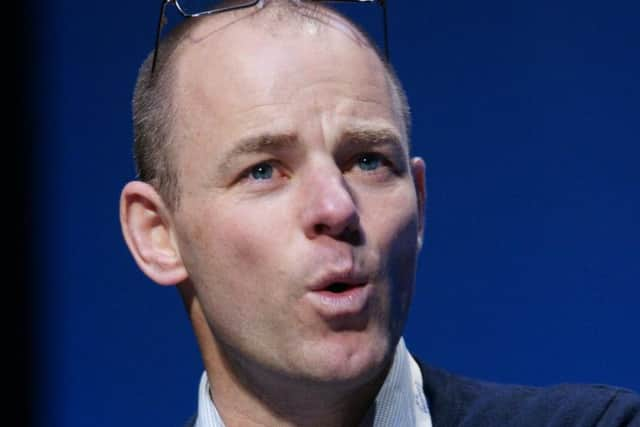Executive pay at Northamptonshire academy schools criticised by teaching union


Companies House papers reveal that ten academy trusts last year paid some members of staff more money than the Prime Minister.
Among them, the former CEO at David Ross Education Trust (DRET), Wendy Marshall – who managed a number of schools including Malcolm Arnold Academy – last year earned £190,000, prompting teaching union, NASUWT, to call for justification. The trust says its salaries are regularly reviewed.
Advertisement
Hide AdAdvertisement
Hide AdNorthamptonshire county secretary for NASUWT, Richard Kempa, is calling on the trusts to put more money back into the classrooms.


He said: “The NASUWT is very concerned with the fat cat salaries that too many academy trust employees are earning. This money should be going into classrooms, for teachers, teaching assistants and resources.
“Too much money is being diverted towards excessively high salaries...salaries that are more than the Prime Minister.”
What is an academy?
Academy schools are state-funded schools in England, which are directly funded by the Department for Education (DoE) and do not have to answer to the local authority. The schools can set their own term times and don’t have to follow the national curriculum.


Advertisement
Hide AdAdvertisement
Hide AdAcademies may receive additional support from sponsors, such as businesses, to help boost performance levels.
Academy trusts are free to set their own salaries for staff. But the DoE expect their pay to reflect the complexity and size of the leadership task, as they must deliver value for money.
During the 2016/17 school year eight members of staff were paid more than £100,000 at DRET, according to figures at Companies House.
In this school year, a spokeswoman for the trust said the figure had since reduced to five members of staff out of 1,900 colleagues across 34 schools in the East Midlands, Yorkshire and London.
Advertisement
Hide AdAdvertisement
Hide AdThree of those five members of staff are senior educational staff.
The trust keeps remuneration under regular review and, since the beginning of this academic year, has reduced senior director posts and seen its leaders waive pay rises, eligible bonuses and accept reductions in pay, she confirmed.
Back in February this year the Academies Minister, Lord Agnew, challenged 88 multi-academy trusts across the country that pay a salary of more than £150,000 – and a further 47 multi-academy trusts paying two or more people between £100,000 and £150,000 – to prove their salaries are justifiable and that there is clear evidence for paying them.
Richard Kempa added: “NASUWT members are sick and tired of excessive high salaries within trusts when there are jobs at risk and redundancies threatened.
Advertisement
Hide AdAdvertisement
Hide Ad“Academy trusts need to be far more accountable and transparent with our members and other stakeholders (all trade unions, parents, communities, students and elected councillors).
“Put this money back into classrooms where it belongs,” he said.
Other findings in the Companies House documents include J Herriman being paid up to £155,000 by The Duston Education Trust in 2016. She left her position in the same year.
A spokesperson for the trust said: 'We do not comment publicly on the individual salaries of employees, past or present. Mrs Herriman left The Duston School in Summer 2016."
Advertisement
Hide AdAdvertisement
Hide AdGreenwood Academies Trust (GAT) – which runs a number of academies including Weston Favell Academy – paid one member of staff in 2017 £170,000.
A GAT spokeswoman said: “We are a national provider of 32 academies, proud to be delivering high-quality education to 17,000 children and young people, many from disadvantaged backgrounds, and it is essential we are able to recruit and retain excellent staff, at all levels, and reward them accordingly.
"Salaries across the Trust are set by the Trust board after benchmarking, taking into account DfE guidance and performance in all areas. Since our current senior team has been in place, they have worked with our schools to support them in raising standards, reflected in the high and increasing proportion of our academies rated Good or Outstanding. More than 80% of our schools inspected since joining the Trust are rated Good or Outstanding."
While teachers’ pay across the Trust has risen since September 2016, our chief executive and deputy chief executive have not accepted an increase in pay or conditions during this same period.”
Advertisement
Hide AdAdvertisement
Hide AdLast year this newspaper reported that Victoria Bishop – who was described on Sir Christopher Hatton’s website as executive principle and CEO of Hatton Academies Trust – earns between £175,000 and £180,000.
This week, the trust has justified the spending.
William Thallon, chair of the board of directors at Hatton Academies Trust, which oversees four schools, said: "Pay levels within the Hatton Academies Trust are determined by a rigorous, fair performance management system, and by the overwhelming need to recruit and retain high-quality staff. This applies in particular to our most senior staff, and is the main way in which we can continue to provide the highest possible standard of education to our young people.
"The Board of Directors has approved and is supportive of, the Trust’s pay policy and its application. We do not believe it is right to comment publicly on the pay of any individual employee. However, it is worth noting that, as with all academy trusts, we are required to account openly for our pay policy and decisions to the ESFA (Education and Skills Funding Agency).
The Brooke Weston Trust employs 900 staff in 10 schools across North Northamptonshire – including the Brooke Weston Academy in Corby – and in Cambridgeshire. Their highest paid member of staff earned up to £170,000 last year.
Advertisement
Hide AdAdvertisement
Hide AdA spokeswoman said neither the chief executive nor finance director were present during pay discussions.
"The Brooke Weston Trust operates schools with a combined pupil access number of nearly 7,000 and employs 900 staff across North Northamptonshire and Cambridgeshire. The Chief Executive’s salary is set by the Trust Board with consideration to market standards and the published figure includes salary, national insurance contributions, pension contributions and a performance-related element. The CEO receives no further benefits for the role.
"The Trust operates a Remuneration Committee comprising the Chair of the Trust Board, a lead Sponsor and an educational specialist Board member. The Committee uses benchmark data to help set salaries, annual pay awards and, in previous years, consider performance bonus payments for leaders. The Committee robustly challenges the recommendations of the Chief Executive and Finance Director on salaries and pay awards before approving or deferring decisions pending review. Neither the Chief Executive nor the Finance Director are present during discussions of their own pay, nor make any recommendations to the Committee in relation to their own pay.
"Since September 2014 the Board has made one pay award to our Chief Executive of 1%, which was in September 2017. During the same period it has made pay awards to teaching and support staff of 1% in 2014, 2015 and 2016. In 2017 teachers received a 2% pay award and the Trust introduced a revised pay scale for all support staff which has been welcomed by trade unions.
Advertisement
Hide AdAdvertisement
Hide Ad"Value for money - The Trust is proud of the difference it is making in locations with historically low levels of educational performance and in schools that struggled to find sponsors until they joined our Trust. For example, the improvements at Thomas Clarkson Academy in Wisbech are being secured against a complex set of social, financial and legal (PFI) constraints. Brooke Weston Academy in Corby is an outstanding school ranked in the top 10% nationally for its performance and with a strong track record of addressing disadvantage. Corby Technical School, our secondary free school in Corby, serves the town centre population and was one of the first secondary free schools to be judged outstanding. All primary schools that have been inspected since joining the Trust are now rated good."
The Education Fellowship Trust (TEFT) was asked to hand its 12 schools back to the Government in March 2017 as five of its schools were rated as Inadequate.
Papers shown to the Chron by NASUWT show that one worker earned up to £170,000.
A spokeswoman for TEFT said: "The Board of Trustees at TEFT passed a resolution to terminate its funding agreement and re-broker all of its academies. The figures referred to are relevant to a period when TEFT was still fully operational.
Advertisement
Hide AdAdvertisement
Hide Ad"During the re-brokering process, head office staffing costs have been dramatically reduced but key staff are still required to remain in post, in order to facilitate the ongoing process.
"Once all schools have been transferred to new trusts, the Department for Education will continue to work with TEFT to complete the wind-up of the trust. In the meantime, the CEO has tendered his notice, ensuring drawdown of his salary will cease."
United Learning Trust – which runs Northampton Academy – educates more than 40,000 children across the country in 65 schools that include independent schools and academies. Last year, two members of staff were paid up to £160,000.
A spokesman for United Learning said: “United Learning employs over 7,500 staff and educates over 40,000 children across the country in 65 schools that include independent schools and academies. We specialise in transforming local schools and raising attainment across the board as we have successfully demonstrated through our track record in Northamptonshire.
Advertisement
Hide AdAdvertisement
Hide Ad“Running an organisation of this size and scope requires a skilled workforce at all levels and, in a highly competitive market, we pay the going rate at all levels commensurate with the experience and expertise required. Our structure includes senior leaders who each oversee a number of schools and help drive improvement and performance.
“We aim to attract the best people to these big jobs, because excellent leadership is what makes the biggest difference to children in our schools. We make no apology for paying highly effective people well for very demanding and responsible jobs. They would earn far more in similarly accountable private sector jobs.
“It is hugely regrettable that NASUWT is attacking hardworking public servants in this way: they would be better off pointing out how far behind the private sector senior public sector pay has fallen. We do not support their ‘naming and shaming’ approach – they would strongly oppose the pay of their individual members being published and criticised, and the same principle applies to all our staff. We fully comply with all requirements on us and are transparent about the number of people earning at higher level, but do not think it appropriate to reveal pay of individual employees.”
Lion Academy Trust, which run six schools, paid one member of staff up to £170,000 last year. Similarly, The Creative Education Trust, operate 13 schools, and paid their top earner up to £180,000 and lastly E-Act, which run 25 schools, paid one boss up to £160,000. These three trusts had not responded to requests for comment by the time of publication.